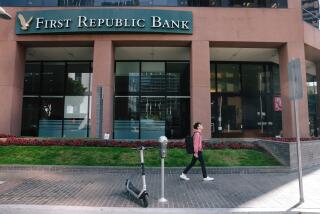Japan’s Top Banks to Share in Cleanup of Massive Debt
- Share via
Japan’s top commercial banks have agreed on how to share a multibillion-dollar funding burden for a bad-debt cleanup program for seven mortgage companies, or jusen, paving the way for the controversial plan.
But the banks have yet to devise a structure for shouldering more costs, as requested by the government, to keep Japanese taxpayers from picking up a big part of the bill.
The move is the latest step in the effort to keep the nation’s financial system stable in the face of massive debt losses, which exceed those in the U.S. savings and loan crisis of the 1980s. The Finance Ministry has estimated outstanding unretrievable loans at about $325 billion, but many analysts believe the actual amount of bad debt in Japan related to the real estate collapse exceeds $500 billion--and the immediate jusen rescue is just a fraction of that.
Banking officials said Thursday that the nation’s leading commercial banks and the Finance Ministry had agreed on the details of a plan under which the banks will jointly pay out $7.32 billion to liquidate seven debt-ridden mortgage firms.
The money will be used to set up and fund a special body, due to debut later this month, that will try to salvage what it can from the mess by collecting loans and managing the seven mortgage firms’ assets to minimize future losses.
The amount of money to be paid by each bank ranges from $36.3 million to $545 million, and 10 “city” banks have agreed to pick up a bigger part of the tab than long-term credit banks and trust banks, the banking officials said.
The Industrial Bank of Japan Ltd., the Bank of Tokyo-Mitsubishi Ltd., Sumitomo Bank Ltd., Fuji Bank Ltd., Sanwa Bank Ltd., Dai-Ichi Kangyo Bank Ltd. and Sakura Bank Ltd. all agreed to provide $545 million.
But Chuo Trust & Banking Co., a smaller bank, will provide $118 million, and Nippon Trust Bank Ltd. will give $36.3 million, they added.
Although the plan has not yet been approved by the banks’ boards, the banks have told the ministry they would accept it, the officials said.
In addition, the Finance Ministry has asked regional banks to contribute.
Of the more than $9 billion raised from the finance industry, $909 million will be used as capital for the loan-collecting body, banking officials said.
The program will use a combination of central bank funds, taxpayers’ money and funds raised from the private sector to dissolve the mortgage firms.
The companies overlent in the heady 1980s, when land and asset prices were soaring, and were left with a bad-debt hangover when the bubble burst.
The government’s plan to use taxpayers’ money in the liquidation of the firms stirred fierce opposition and delayed the passage of legislation needed for the scheme, which was completed only last month.
In the face of the criticism, the government asked banks last month to shoulder still more of the burden of the windup to minimize the use of state funds. The overall recovery of banks in the last few months has made them more willing to cooperate.
More to Read
Inside the business of entertainment
The Wide Shot brings you news, analysis and insights on everything from streaming wars to production — and what it all means for the future.
You may occasionally receive promotional content from the Los Angeles Times.









